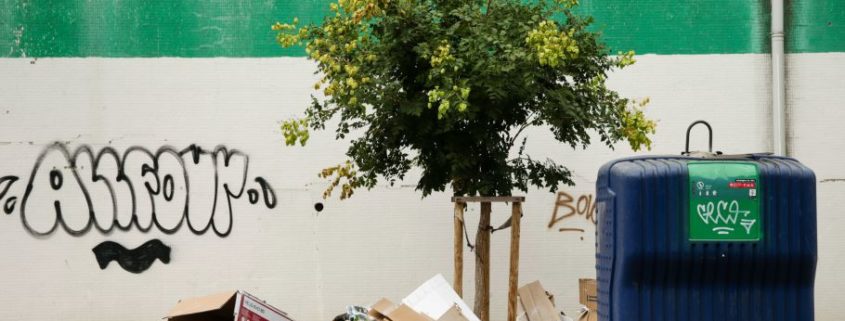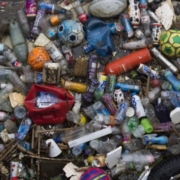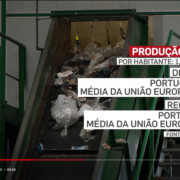Dumping
“The planet is witnessing the appearance of new creatures, ones that have already conquered all continents. At first glance, they seem very delicate and frail but this is an illusion – they are long-lived, almost indestructible: their fleeting bodies won’t decompose for some three hundred more years.
These plastic bags are empty on the inside, and this historic foregoing of all contents unexpectedly affords them great evolutionary benefits”
( Olga Tokarczuk in Flights – Man Booker International 2018)
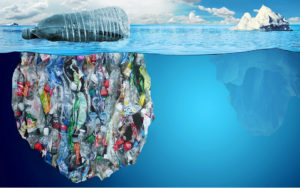 Plastic has proven to be indispensable in our global economy; most is used as packing material. Despite the fact that over 13 million tons of plastic are annually dumped into our oceans – every minute a truckload – the global production of plastic is still on the increase.
Plastic has proven to be indispensable in our global economy; most is used as packing material. Despite the fact that over 13 million tons of plastic are annually dumped into our oceans – every minute a truckload – the global production of plastic is still on the increase.
 In Europe circa 30% of plastic is recycled.
In Europe circa 30% of plastic is recycled.
If it is up to the Portuguese Parliament plastic bags – as well as plastic packing material for fruit, vegetables and bread – will be forbidden from June 2020.
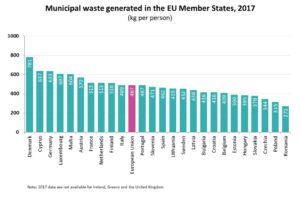 Every Portuguese citizen produces about 480 kg of garbage per year (~ 1,3 kg per day), just as much as the average European. However, the separate collection of paper, glass and plastic in Portugal is still very limited and only 10-15% recycled.
Every Portuguese citizen produces about 480 kg of garbage per year (~ 1,3 kg per day), just as much as the average European. However, the separate collection of paper, glass and plastic in Portugal is still very limited and only 10-15% recycled.
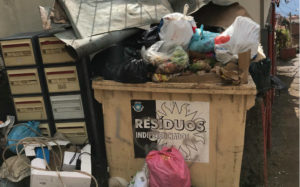 Since the tourist boom some seven years ago, urban waste production in the capital has nearly doubled. Especially downtown – Cais do Sodré, Misericórdia and Bairro Alto, where most tourists stay and the nightlife takes place – garbage accumulates. It leaves no doubt that – besides separation of waste – the frequency of collection services has to be intensified.
Since the tourist boom some seven years ago, urban waste production in the capital has nearly doubled. Especially downtown – Cais do Sodré, Misericórdia and Bairro Alto, where most tourists stay and the nightlife takes place – garbage accumulates. It leaves no doubt that – besides separation of waste – the frequency of collection services has to be intensified.
Another major polluter is the textile industry, the second largest after the oil industry. Although one can nowadays buy a T-shirt and a pair of jeans for almost no money, few people realize the enormous footprint – of nearly 15.000 litres of water – it takes to produce them. The manufactory of clothing has doubled in the last 15 years, whereas its lifespan was halved. Fast fashion rules!
 Each year the Portuguese throw away 200,000 tons of textile (~20 kg per person). Although in some places – e.g. Braga –selective collection of textile takes place, the majority of unwanted clothes end up in the incinerator or on the garbage dump.
Each year the Portuguese throw away 200,000 tons of textile (~20 kg per person). Although in some places – e.g. Braga –selective collection of textile takes place, the majority of unwanted clothes end up in the incinerator or on the garbage dump.
Bom fim de semana Enjoy the weekend (pics Sapo/DN/Público)

